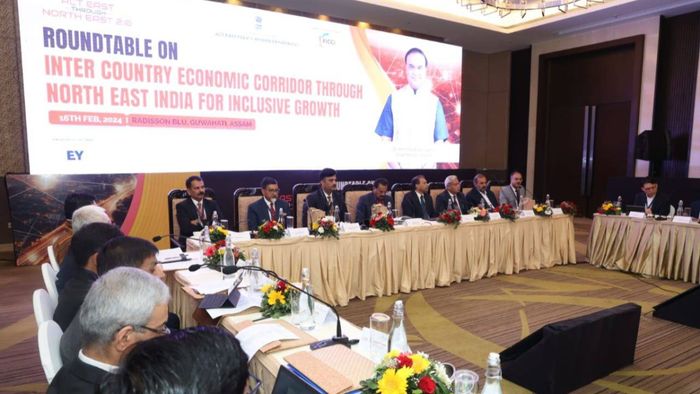Assam at centre of India’s development narrative due to Act East Policy, says minister
Assam's Act East Policy Affairs Minister Chandra Mohan Patowary today stated that the Act East Policy, under the stewardship of Prime Minister Narendra Modi, has reinvigorated India's engagement with its Eastern neighbours.

- Feb 16, 2024,
- Updated Feb 16, 2024, 5:16 PM IST
Assam's Act East Policy Affairs Minister Chandra Mohan Patowary today stated that the Act East Policy, under the stewardship of Prime Minister Narendra Modi, has reinvigorated India's engagement with its Eastern neighbours, while the country’s relationships with Bangladesh and Bhutan have seen a new era of cooperation in areas of trade, transit and water resources management.
Patowary made the statement as he attended the inaugural session of “Act East through Northeast 2.0 - The Round Table Conference on Inter Country Economic Corridor through North East of India for Inclusive Growth” held at a hotel in Guwahati.
In his keynote address, Minister Chandra Mohan Patowary said that Assam and Northeast are witnessing rapid development in road infrastructure, regional airways connectivity, railways, waterways and shipping and internet connectivity. The central government led by Prime Minister Modi has taken the region to high growth trajectory with the implementation of Act East Policy and NE is acting as India’s bridge with ASEAN and SE countries, he said.
“The Government of Assam, led by Chief Minister Dr Himanta Biswa Sarma, is deeply committed to harnessing these natural endowments and transforming the state into an economic hub. Our policies are focused on creating a business-friendly environment, facilitating ease of doing business, and developing world-class infrastructure to attract domestic and international investors. Sectors such as agriculture, food processing, handicrafts, tourism, and information technology are ripe for investment, bolstered by a young, skilled workforce and supportive government policies,” Patowary stated.
Building on the momentum of the previous successful conclave in 2022, the second instalment of the roundtable conference organised by Act East Policy Affairs Department, Govt of Assam aims to explore the fresh opportunities presented by the Act East Policy for the Northeast region. It also seeks to develop a strategic framework for enhancing economic and cultural connections with Southeast Asian countries, with a focus on bolstering bilateral relations with neighbouring Bangladesh and Bhutan.
The roundtable serves as a platform for government officials, experts, practitioners, and business leaders to explore the potential opportunities arising from the evolving connectivity among Bhutan, Bangladesh, Nepal, and Assam.
The Act East Policy Affairs Department Minister also highlighted how Assam and Northeast have been able to reap significant economic benefits due to closer ties with BBN and SE Asian countries. The use of Chittagong and Mongla ports in Bangladesh will further strengthen waterways connectivity in Northeast and mutually benefit both countries, he said.
Patowary also highlighted how Bangladesh can take the opportunities of potential sectors of Assam like ethanol, methanol, plastic, hydrocarbon to improve trade and business.
Today’s roundtable also featured a series of sessions, including special addresses by distinguished speakers such as Ruhul Amin, Assistant High Commissioner of Bangladesh in Guwahati and Mr. Manvendra Pratap Singh Secretary, Act East Policy Affairs, Government of Assam. Other notable speakers included Sudhakar Dalela, Ambassador of India to Kingdom of Bhutan, Naveen Srivastava Ambassador of India to Nepal, CSR Ram, Joint Secretary, Ministry of External Affairs, Satish Kumar Pandey, GM(Construction), NF Railway among others.
The event also marked the release of a pivotal report titled "Inter Country Economic Corridor Through North East of India for Inclusive Growth: Potential and Prospects," providing a roadmap for sustainable and inclusive development in the region through development of economic corridors in Bangladesh, Bhutan and Nepal which passes through Assam (India).
During the daylong conference, various connectivity initiatives like the a 58-km rail link between Gelephu in Bhutan and Kokrajhar in Assam, riverine linkages with Bangladesh, various road and railway projects connecting the neighbouring countries were highlighted. Detailed discussions were held on ways to use the evolving connectivity with neighbouring countries to create a economic corridor.